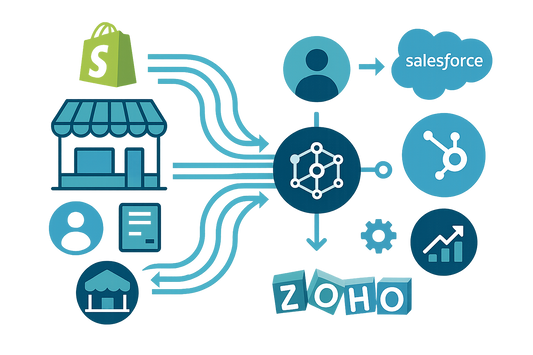Boosting Customer Retention on Shopify: Best Practices
Share
In the ever-evolving world of e-commerce, customer retention has become a pivotal focus for businesses aiming to thrive in a competitive marketplace. Shopify, a leading platform for online stores, offers a myriad of tools and features that can be leveraged to enhance customer loyalty. One of the most effective strategies to achieve this is through personalization. By tailoring the shopping experience to meet the unique preferences and needs of each customer, businesses can foster a deeper connection and encourage repeat purchases.
To begin with, understanding your customers is the cornerstone of any successful personalization strategy. Shopify provides robust analytics tools that allow businesses to gather valuable insights into customer behavior, preferences, and purchase history. By analyzing this data, businesses can segment their audience into distinct groups, enabling them to create targeted marketing campaigns that resonate with each segment. For instance, a fashion retailer might identify a group of customers who frequently purchase athleisure wear and tailor their email marketing campaigns to showcase the latest trends in that category.
Moreover, personalized product recommendations are a powerful way to enhance the shopping experience on Shopify. By utilizing machine learning algorithms, businesses can analyze a customer's browsing and purchase history to suggest products that align with their interests. This not only increases the likelihood of a purchase but also demonstrates that the business understands and values the customer's preferences. Additionally, implementing personalized recommendations on the homepage, product pages, and even in follow-up emails can significantly boost engagement and conversion rates.
Another effective personalization strategy is to offer exclusive discounts and promotions to loyal customers. Shopify's platform allows businesses to create customized discount codes and promotions that can be targeted to specific customer segments. For example, offering a special discount to customers who have not made a purchase in a while can incentivize them to return and shop again. Similarly, rewarding frequent buyers with exclusive offers can reinforce their loyalty and encourage them to continue choosing your brand over competitors.
Furthermore, personalized communication is key to building lasting relationships with customers. Shopify enables businesses to automate personalized email campaigns that address customers by name and reference their past interactions with the brand. This level of personalization makes customers feel valued and appreciated, fostering a sense of loyalty. Additionally, businesses can use Shopify's integration with various customer relationship management (CRM) tools to track customer interactions and tailor communication accordingly. Whether it's sending a birthday greeting with a special offer or following up on a recent purchase with product care tips, personalized communication can significantly enhance the customer experience.
In addition to these strategies, businesses should also focus on creating a seamless and personalized checkout experience. Shopify's customizable checkout process allows businesses to tailor the checkout flow to match their brand's identity while also offering personalized options such as saved payment methods and shipping preferences. By streamlining the checkout process and making it as convenient as possible, businesses can reduce cart abandonment rates and increase customer satisfaction.
In conclusion, personalization is a powerful tool for boosting customer retention on Shopify. By leveraging data-driven insights, businesses can create tailored experiences that resonate with their customers, ultimately fostering loyalty and encouraging repeat purchases. As the e-commerce landscape continues to evolve, businesses that prioritize personalization will be well-positioned to build lasting relationships with their customers and achieve long-term success.
Implementing Effective Loyalty Programs to Retain Shopify Customers
In the competitive world of e-commerce, retaining customers is just as crucial as acquiring new ones. For Shopify store owners, implementing effective loyalty programs can be a game-changer in boosting customer retention. These programs not only encourage repeat purchases but also foster a sense of community and brand loyalty among customers. By understanding the key elements of successful loyalty programs, Shopify merchants can create strategies that resonate with their audience and drive long-term engagement.
To begin with, a well-designed loyalty program should be simple and easy to understand. Customers are more likely to participate if the program's benefits and requirements are clear. Therefore, it is essential to communicate the value proposition effectively. For instance, offering points for every purchase that can be redeemed for discounts or free products is a straightforward approach that customers can easily grasp. Additionally, providing a seamless user experience by integrating the loyalty program into the Shopify store's existing infrastructure can enhance customer satisfaction and participation.
Moreover, personalization plays a pivotal role in the success of loyalty programs. By leveraging customer data, Shopify merchants can tailor rewards and offers to individual preferences, making the program more appealing. Personalized recommendations based on past purchases or browsing behavior can make customers feel valued and understood, thereby increasing their likelihood of returning. Furthermore, segmenting customers based on their purchasing habits and engagement levels allows for targeted marketing efforts, ensuring that the right incentives reach the right audience.
In addition to personalization, creating a tiered loyalty program can add an element of exclusivity and motivation. By offering different levels of rewards based on customer spending or engagement, Shopify store owners can encourage customers to strive for higher tiers. This not only increases the frequency of purchases but also enhances the overall customer experience. For example, offering exclusive access to new products, special discounts, or early sales to top-tier members can make them feel like VIPs, strengthening their connection to the brand.
Another effective strategy is to incorporate social sharing into the loyalty program. Encouraging customers to share their purchases or experiences on social media in exchange for rewards can amplify brand visibility and attract new customers. This not only leverages the power of word-of-mouth marketing but also creates a sense of community among customers. By fostering a loyal customer base that actively promotes the brand, Shopify merchants can achieve sustainable growth and retention.
Furthermore, it is crucial to continuously evaluate and refine the loyalty program to ensure its effectiveness. Gathering feedback from customers and analyzing data on program participation can provide valuable insights into what works and what needs improvement. By staying attuned to customer preferences and industry trends, Shopify store owners can adapt their loyalty programs to remain relevant and engaging.
In conclusion, implementing effective loyalty programs on Shopify requires a thoughtful approach that prioritizes simplicity, personalization, and engagement. By creating a seamless and rewarding experience for customers, merchants can foster long-term relationships and drive repeat business. As the e-commerce landscape continues to evolve, those who invest in building strong customer loyalty will undoubtedly stand out and thrive. With the right strategies in place, Shopify store owners can inspire their customers to keep coming back, turning one-time buyers into lifelong brand advocates.
Utilizing Data Analytics to Improve Customer Retention on Shopify
In the ever-evolving world of e-commerce, customer retention is a critical component of sustained success. For Shopify store owners, leveraging data analytics can be a game-changer in understanding and improving customer retention. By harnessing the power of data, businesses can gain valuable insights into customer behavior, preferences, and trends, ultimately leading to more informed decisions and strategies that foster loyalty and repeat business.
To begin with, data analytics allows Shopify merchants to segment their customer base effectively. By analyzing purchase history, browsing behavior, and demographic information, businesses can categorize customers into distinct groups. This segmentation enables personalized marketing efforts, ensuring that each customer receives relevant and engaging content. For instance, a customer who frequently purchases athletic wear might appreciate targeted promotions on new arrivals in that category. Such personalized experiences not only enhance customer satisfaction but also increase the likelihood of repeat purchases.
Moreover, data analytics can help identify patterns and trends in customer behavior. By examining metrics such as average order value, purchase frequency, and customer lifetime value, businesses can pinpoint which customers are most valuable and which ones may be at risk of churning. This information is crucial for developing targeted retention strategies. For example, a customer who has not made a purchase in several months might benefit from a re-engagement campaign, offering a special discount or personalized recommendation to entice them back to the store.
In addition to understanding customer behavior, data analytics can also provide insights into the effectiveness of marketing campaigns. By tracking key performance indicators such as click-through rates, conversion rates, and return on investment, businesses can assess which campaigns are driving customer retention and which ones need improvement. This data-driven approach allows for continuous optimization of marketing efforts, ensuring that resources are allocated to strategies that yield the highest returns.
Furthermore, data analytics can enhance the overall customer experience on a Shopify store. By analyzing website traffic and user interactions, businesses can identify areas for improvement in the customer journey. For instance, if data reveals that a significant number of customers abandon their carts at the checkout stage, it may indicate a need to streamline the checkout process or offer additional payment options. By addressing these pain points, businesses can create a seamless and enjoyable shopping experience that encourages customers to return.
Another powerful application of data analytics is in inventory management. By analyzing sales data and customer demand patterns, businesses can optimize their inventory levels, ensuring that popular products are always in stock. This not only prevents lost sales due to stockouts but also enhances customer satisfaction by meeting their expectations. Additionally, data analytics can help identify slow-moving products, allowing businesses to implement targeted promotions or discounts to clear excess inventory.
In conclusion, utilizing data analytics on Shopify is an invaluable strategy for boosting customer retention. By gaining a deeper understanding of customer behavior, preferences, and trends, businesses can develop personalized marketing efforts, optimize the customer experience, and make informed decisions that drive loyalty and repeat business. As the e-commerce landscape continues to evolve, embracing data-driven strategies will be essential for Shopify merchants looking to thrive in a competitive market. With the right tools and insights, businesses can inspire customer loyalty and achieve long-term success.



